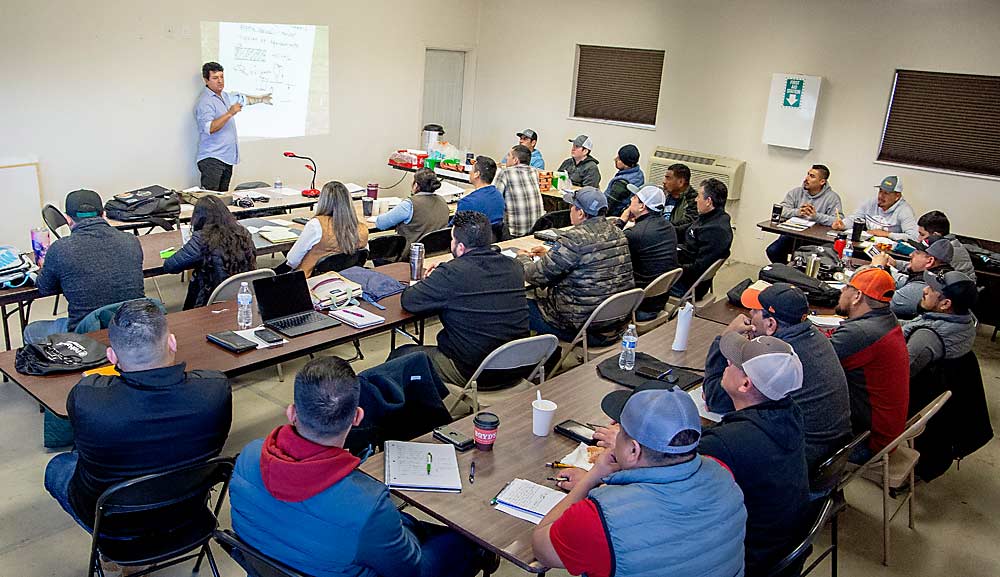
Editor’s note: This story has been edited to convey that Yakima Valley College requires two previous years of classes for students to enroll in the four-year Bachelor of Applied Science agricultural degree program.
Farmworkers are scarce.
But farm jobs are changing, too, as emerging technology skews needed skills. Irrigators make decisions using soil moisture probes. Picking crews may need to repair robotic arms. As for tractor drivers — what drivers?
Meanwhile, leadership concepts are also evolving, with mental health and emotional intelligence playing larger roles for supervisors.
Colleges, technical schools and industry programs are trying to keep up, searching for ways to provide next-generation skills to the next-generation workforce.
At the well-entrenched Wenatchee Valley College Hispanic Orchard Employee Education Program, the concept of next-generation takes a literal tone.
After 24 years of teaching, Francisco Sarmiento Sr. has become faculty lead while his son, Francisco “Frank” Sarmiento Jr., began teaching with him a little more than one year ago. The program, usually called HOEEP, offers seven certificate programs in tree fruit and wine grapes.
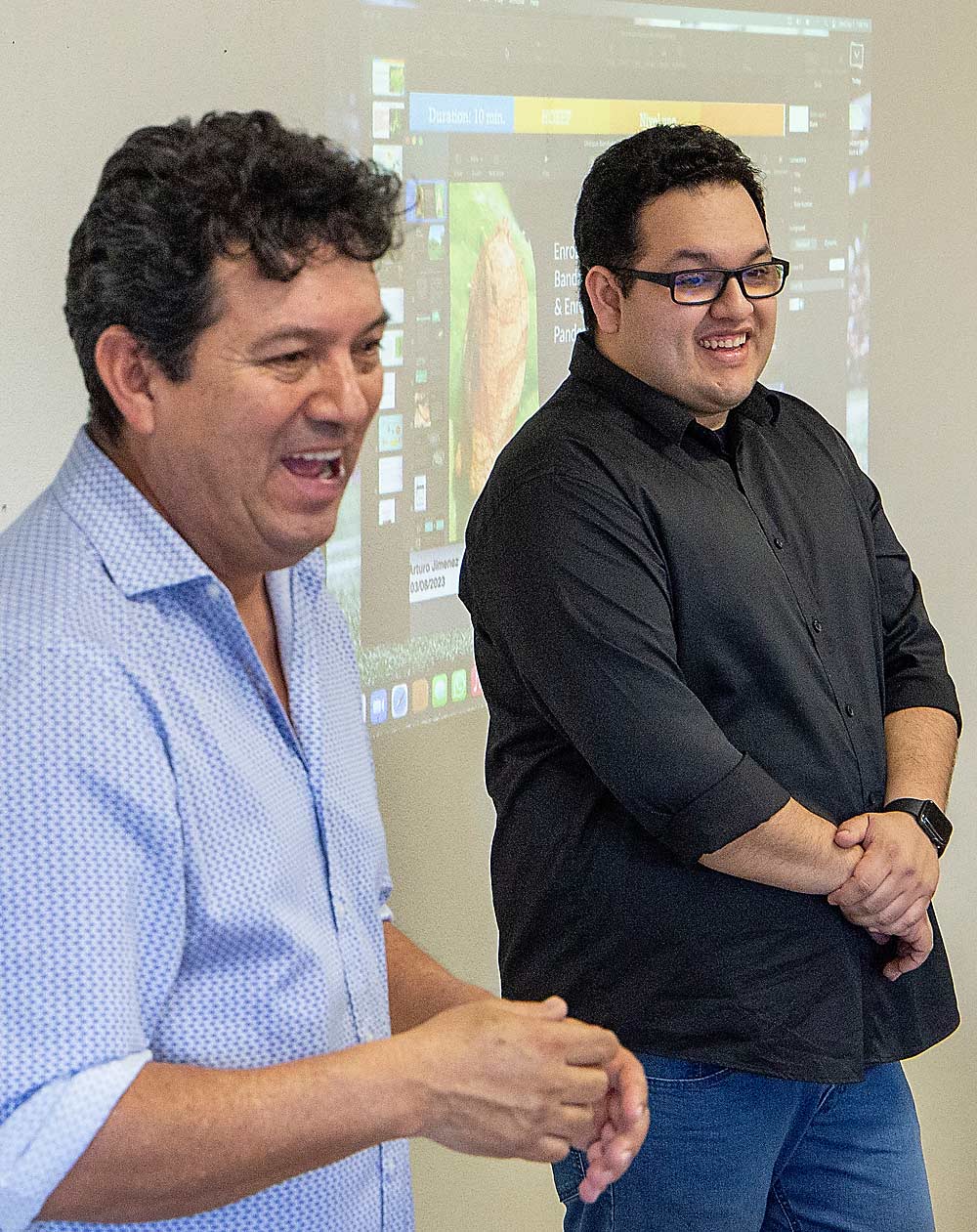
As one of Washington’s Integrated Basic Education and Skills Training, or I-BEST, programs, the courses require two instructors: one for technical content, the other to teach basic skills in reading, math, writing and English. For this year’s classes, father and son commute together from Wenatchee to a remote labor housing facility near Royal City for the horticulture classes and to Grandview for viticulture.
The weekly program usually fills up with students — often sent by their employers — to learn integrated pest management, farm management, public speaking and more. Demographics have been shifting, Francisco said. When it started, students were in their 40s, with little schooling obtained during their childhoods in Mexico. He was one of them. He went on to Washington State University for his bachelor’s degree.
Today, younger students are more common, Francisco said. Many of them aim for a two-year degree.
“(HOEEP) has been changing and adapting to the industry,” he said.
Frank grew up around orchards and worked for a few fruit companies before joining his father in the classroom. He understands technology better than his father. Both admit it.
“It’s awesome that I’m following in his footsteps and also that I’m paving my own way,” he said.
It’s a challenge to expose students to the rapidly shifting technology of the industry, they said. They take field trips to research stations and working orchards, but the instructors do not have robotics in the classroom. Students are more likely to see new tools, such as electrostatic sprayers or camera-equipped codling moth traps, on the job.
“They get info from the industry,” Francisco said.
Miguel Ramirez, a supervisor for Zirkle Fruit and current HOEEP student, welcomes technology that makes jobs at the farm easier. He uses sensors to check tree growth, manage irrigation and monitor pests, either on a computer or phone. Manuals for technology are self-explanatory, detailed and easy to understand, he said.
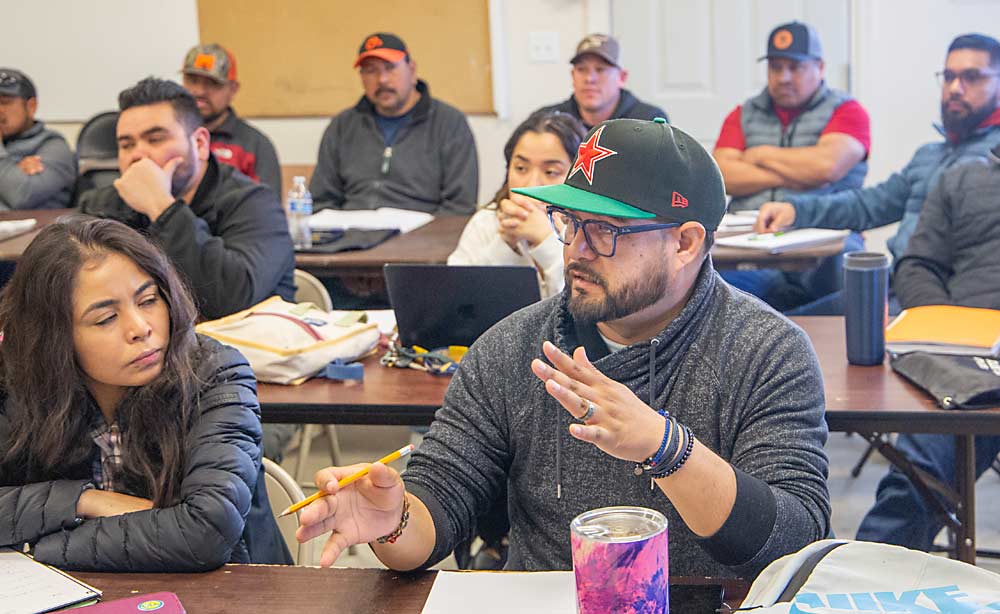
“As long as technology is being used in a helpful way, we’ll continue to use it,” he said. “I’m not afraid.”
Students say they want to broaden their horizons and to climb the management ladders at their companies. To that end, the Sarmientos encourage their students to practice public speaking, too.
Cinthya Juvera, an IPM scout and supervisor for H2O Vineyards, presented a slideshow about mealybugs at a sustainable agriculture workshop in early March in Prosser. The Pasco resident’s goal is to learn enough about pest management to write her own treatment recommendations.
“I can do both, and that way I can cover a lot more area and I have more knowledge, not just of the pests themselves, but also of the chemicals that we can put in the vineyard,” she said.
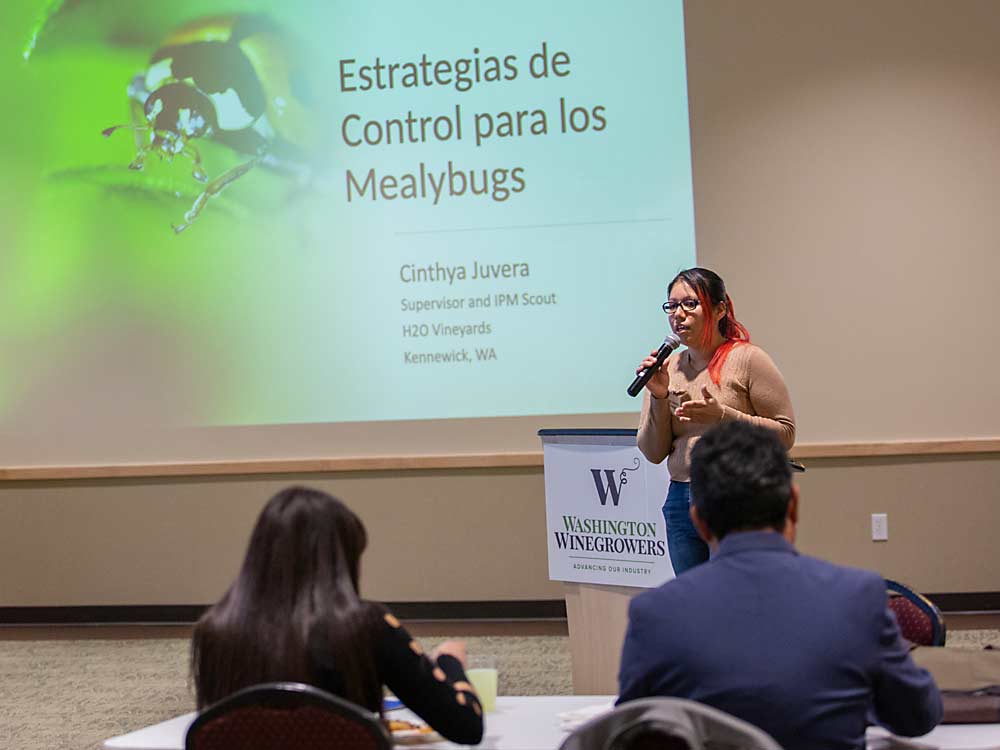
More demand for degrees
Recently, other Washington colleges have begun offering four-year degrees, joining WSU in catering to students seeking professional ag careers. Demand is high for those employees, too, said Tadd Wheeler, faculty lead for the WSU ag tech degree. Each year, recruiters leave with positions and internships unfilled.
“There’s more demand than we can fill,” Wheeler said.
Yakima Valley College started a four-year degree program in September 2022, and its first class of six students will graduate in June 2024. Only students with two years already under their belts are eligible. The program has goals for enrollment to grow incrementally each year. It’s one of only two Bachelor of Applied Science degrees in Washington, said Brian Bodah, lead instructor.
Degree programs introduce innovation as much as possible. Technology giant Telus donated coding software for the YVC classroom, for example, while WSU purchased a soil mapper. But the courses are geared toward cultivating well-rounded leaders, not technicians, they said.
“These are going to be the agricultural managers of tomorrow,” Bodah said.
Central Washington University has entered the ag professionalization arena with several certificate programs that can be stacked into a minor or used toward a major.
Angelie Sampson of White Salmon entered school eyeing sports management, until she heard about the agriculture business program. It sounded interesting, because after high school, Sampson began taking summer jobs at Mount Adams Fruit, helping onboard employees and manage bids for school lunch programs and organic audits, among other tasks.

The senior settled on a business administration major, with a focus in supply chain management, that she wants to use in a tree fruit industry career. She even participates in a supply chain certification program called Lean Six Sigma.
“When I came here freshman year, I didn’t know the opportunities there were in supply chain and didn’t know about the Lean Six Sigma certification,” said Sampson, daughter of an electrician and certified nursing assistant.
Gaps and coordination
The list of programs goes on. Some in the tree fruit industry suspect it’s time to conduct an educational inventory to find gaps — and then coordinate to fill them.
“We all don’t know all the players, and we need to know,” said Karen Lewis, director of WSU Extension’s Agriculture and Natural Resources Program Unit. She envisions a flowchart of tree fruit-applicable education programs to guide students and their future employers.
California specialty crop industries are doing this now. Western Growers, which represents fresh produce farms in four Western states, is using California state grants to identify knowledge gaps based on grower needs and to build certificate programs for community colleges to help fill those gaps. The money also helps companies pay for internships for the program’s graduates. A labor nonprofit in Fresno is doing something similar on a more local scale.
Jon DeVaney, president of the Washington State Tree Fruit Association, sees one big gap now. Employers tell him they often want to promote from within but don’t know where to send those potential job advancers to brush up on the necessary skills, or even identify those skills. For example, a seasoned employee may want to become a pesticide applicator but lacks the basic math to accurately mix tanks or adjust valves to account for tractor speed and droplet size.
The tree fruit industry also needs to work with educational service districts and workforce development councils to help young people view agriculture as a career path, not just the entry-level toil their parents endured as a sacrifice to start life in America, DeVaney said. Professional opportunities for tech- and business-savvy young people abound in the industry, but too often the responsibility of finding them falls on a young student.
“That workforce is not just going to magically show up,” DeVaney said.
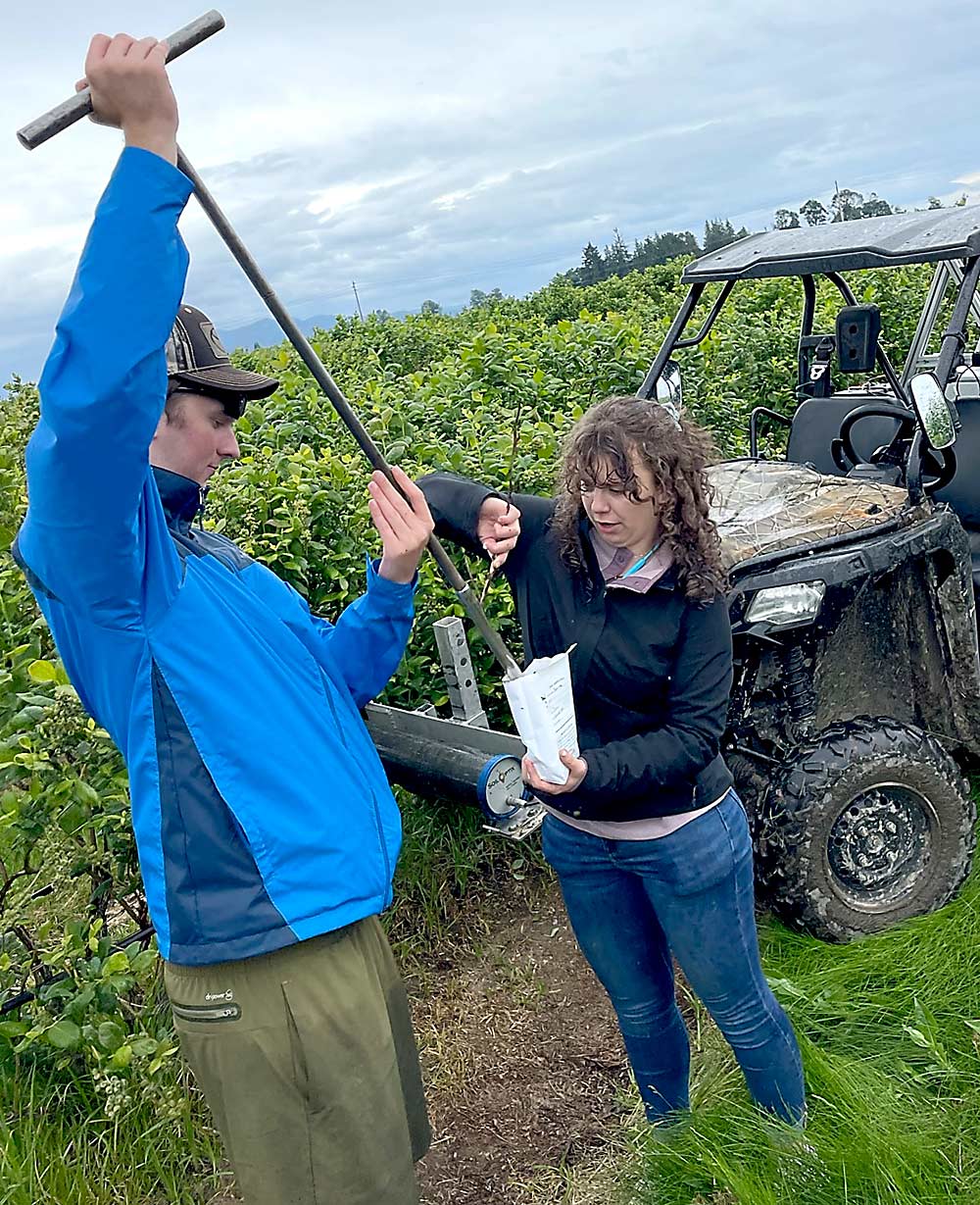
The AgAID Institute, a WSU-led, federally funded collaboration of universities and businesses focused on bringing artificial intelligence to farming, is trying to do some of that. The funding helps to support students interning with ag tech companies, for example.
The institute also holds Agathons, agricultural versions of hackathons — competitions involving computer-savvy students solving technical problems. In November last year, a group of Yakima Valley middle school students from Wapato built their own soil and weather sensors in class, then put them to the test at WSU’s research station in Prosser.
Last fall, at an Eastern Washington high school science fair with 800 students, Steve Mantle of Walla Walla ag tech company innov8.ag shared video of his company’s sensor-rigged ATVs zipping through real orchards and virtual orchards, which were presented with UNITY, a gaming development platform. The kids recognized the software from coding Xbox and PlayStation video game consoles.
“I was blown away,” said Mantle, part of AgAID’s leadership team. “We’re helping the lightbulb turn on for kids.”
Juvera, the IPM scout in the WVC viticulture class, said people her age often view agriculture as just the hard labor her mom has performed for decades. But, the viticulture class showed her the science and excitement behind the job, and therefore more opportunities.
“Sometimes we see agriculture work as poverty-level work,” she said. “But there’s more to it than just the hard labor. You learn more. You experience the whys.”
—by Ross Courtney

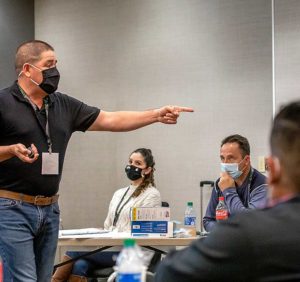
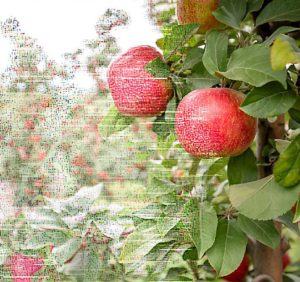





Leave A Comment